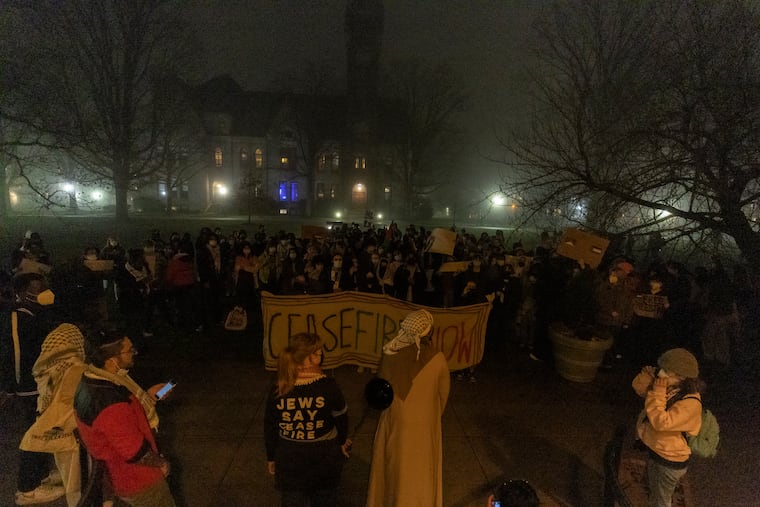Bryn Mawr College trustees to meet with students to address investments following a semester of pro-Palestinian protests
The meeting would make Bryn Mawr among the few higher educational institutions in the region to schedule formal discussions with students over investments

Members of Bryn Mawr College’s Board of Trustees will meet with students this fall to discuss the school’s endowment and investment strategies, the liberal arts college’s outgoing president announced last week.
The decision comes in response to the nationwide protest movement of pro-Palestinian students and supporters who have urged college administrators to divest from companies with business ties to Israel as the war in Gaza drags on.
Bryn Mawr, Haverford, and Swarthmore Colleges, along with the University of Pennsylvania, are among the campuses nationwide that have been the sites of demonstrations and encampments.
But Bryn Mawr would be among the few higher education institutions in the region to schedule formal discussions with students over investments. In May, Rutgers University administrators agreed to meet with pro-Palestinian students to discuss their endowment concerns. Penn had held several negotiations with encampment leaders.
However, President Kim Cassidy’s letter, which was addressed to the campus community on June 21, was short on details of how they might be structured and who would participate.
And the college has previously stated that none of its more than $1 billion endowment is held in investments tied to Israel’s military.
In April, Cassidy and the chair of the board of trustees held an “educational session” with students to review the college’s investment strategy. Those participating were told that a small percentage of the school’s endowment is held in commingled funds that include Israeli companies, according to an attendee.
Cassidy’s letter said that a group of trustees would “devote time around [their] October board meeting to meet in a facilitated session” with campus members over its investment strategy.
She did not say who those members were, and a college spokesperson did not offer further comment.
Cassidy’s 11-year tenure at the college ends Monday, when Wendy Cadge, a dean and religion scholar at Brandeis University in Massachusetts, who was selected president this year, will take office.
Much of Cassidy’s message was devoted to commending the college’s response to an academic year that was defined by the aftermath of Oct. 7 Hamas attacks — and the conversations about antisemitism and Islamophobia that arose as a result.
Cassidy said she wrote the letter to “provide some closure,” particularly after her conversations with faculty, students, alumni, and trustees over Bryn Mawr’s response to the “continuing loss of life, destruction, dislocation, and suffering in Gaza and the terrible events of Oct. 7 and their ongoing impact in Israel.”
The outgoing president also mentioned the college’s commitment to academic freedom and expression.
In reference to the forthcoming conversation with trustees, Cassidy said that ”members of the campus community are interested in learning more about the investment of the college’s endowment, and in sharing perspectives about values and commitments they hope the college will consider in making investment choices.”
Elez Beresin, a rising Bryn Mawr College senior and president of the school’s Jewish Voice for Peace group, said Cassidy’s message was “vague on our end.”
“We’re fairly disappointed that the most we could get our school to commit to was a conversation,” said Beresin, speaking on behalf of JVP. “That feels like extremely bare minimum to us.”
Beresin did say, however, that she hoped the October discussions would lead to conversations about divestment — even if activists would like the college to sever ties that are not directly connected to Israel’s military.
Pro-Palestinian demonstrations erupted across the country during the spring, leaving universities and law enforcement scrambled to address protests that saw students sprawl across college greens and occupy academic buildings.
Some encampments lasted weeks before being removed by law enforcement or voluntarily taken down; many attracted pro-Israel counterprotesters, in some instances leading to skirmishes between groups.
But protests at Bryn Mawr remained peaceful. Students at the women’s institution erected a 25-tent encampment on April 27, and continued to demonstrate through the end of the semester.
Those disruptions led Cassidy to announce in May that the college would be moving its commencement from its long-held location on the central campus to a nearby field.